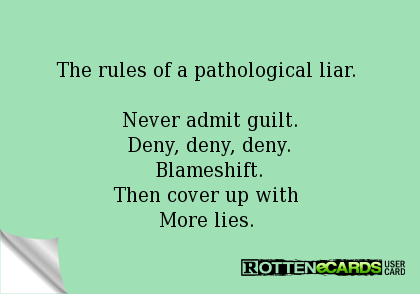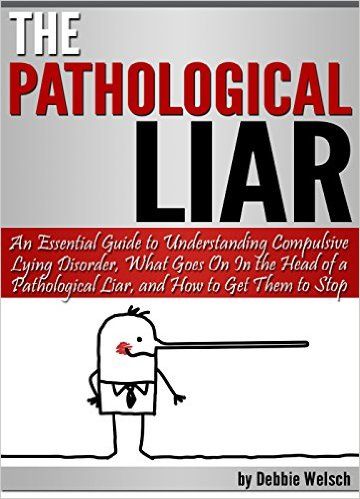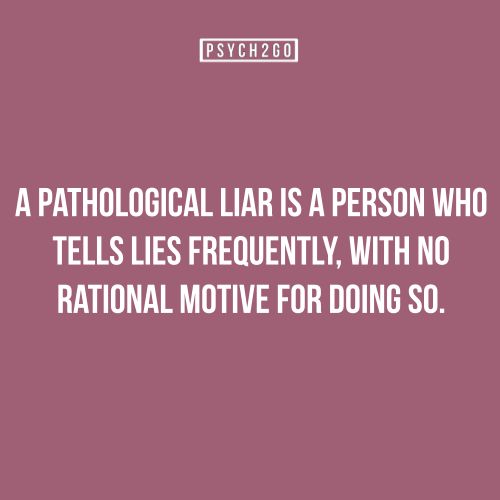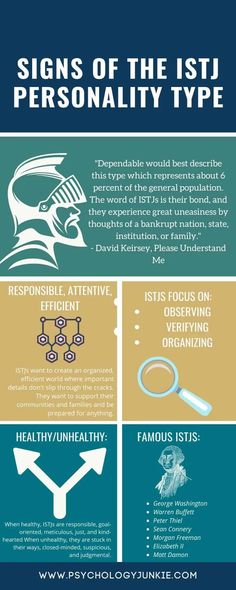My girlfriend is a pathological liar
10 Signs You Are In A Relationship With A Pathological Liar
Before I get into the signs of dating a pathological liar, I want to give you some background on my own personal experiences with lying.
I was never a pathological liar but I definitely used to be a compulsive liar.
Early in my childhood, lying became a habit that soon became a way of life. I had well-intended parents who taught me not to lie but in my little mind, there was no other choice. As I grew up, so did my self-deception, insecurities, and ability to paint an entirely different picture than, unbeknownst to me, most people could see right through. The lying continued well into my teens and early twenties. I didn’t have the awareness that I do now, but I knew the difference between right and wrong. The extent to which we will justify the wrong of lying in the name of emotional survival is incredible. I had to lie.
Without lying, everyone would be in on the joke that I embarrassingly tried to be the only one in on…
The fact that I was a joke.
There are a million reasons why I felt like I had no choice but to lie at such a young age. And there are a million more reasons why I continued to lie as a teenager and young adult.
A lot of them had to do with the atmosphere I grew up in. A lot of it had to do with witnessing the adults lie and being around certain family members who were so insecure themselves, they got satisfaction from being the “Gotcha!” police. They would shame me to others behind my back in the name of expressing concern – instead of having a genuine concern to ask me if I was okay.
Ultimately, no one made me lie. I chose to.
If you’re lying, you’re lonely.
The root of the weed that lying is, will always be the liar’s belief that they are not enough. And there is no lonelier place to be than the space of feeling like you have no worth.
If I didn’t feel like my truth was so pathetic, I would never have felt the need to compulsively lie.
Anyone who lies habitually is on a self-made life raft that deflates very quickly until another lie is told.
Having one identity is tough enough but when you lie, you have to keep up with multiple ones. These identities are birthed by your shame, anger, fear of rejection, fear of judgment, insecurities, and pain. The funny thing is, I lied to keep people around when all it did was turn off the right people, trigger my abandonment issues, and in turn, attract toxic people who exploited the very insecurities that required me to lie on the compulsive level that I was.
How I stopped being a compulsive liar is another post for another time. I basically started to become more worried about the effects of my lies than people just knowing the truth. I got so sick of myself, my oversharing, the drama I had created, and my own bullsh*t, that the truth started to become less scary. I realized that although people may be hurt, disgusted, happy, sad, etc., from hearing my truth… At least they’d respect me for being honest. I then started to attract better people and better relationships in my life.
I then started to attract better people and better relationships in my life.
By taking this step to improve myself, I had simultaneously improved the relationship with myself. Over time, I started to build respect for myself.
Self-respect and pathologically (or compulsive) lying cannot coexist.
When it comes to dating or any kind of relationship, the level to which you deceive yourself will always mirror the toleration you have for others deceiving you.
If you engage in self-deception, you will be that much more susceptible to excuse others when they lie to you.
You will hold onto the little crumbs of truth in their lies because deep down, you don’t believe that you are good enough for the whole truth. And so, you work harder to understand them instead of folding and getting the f*ck out of Dodge.
We all lie from time to time. According to a study at the University of Massachusetts, sixty percent of people cannot even have a 10-minute conversation without lying at least one time.
However…
There’s a big difference between dating someone who has occasionally lied and someone who is a compulsive liar or even worse, a
pathological liar.When lying gets out of control, it is referred to as compulsive. It can also be pathological. Although the definitions are fluid, I do think that there are differences. Either way, a relationship with a pathological liar or a compulsive liar will be the worst relationship of your life. The relationship that you have with them will be just as bad as the one they have with themselves. You can never “rescue” a liar. You can only get away. It is impossible to have a genuine connection, relationship, or any kind of intimacy with these people.
A Compulsive Liar vs. A Pathological Liar
A compulsive liar will habitually exaggerate and embellish in an effort to be seen, heard, and inflate their fragile ego. A pathological liar will lie for many of the same reasons, but when you realize that they’re lying and call them out on it… they will continue to lie and not feel bad about it. Upon being called out, a pathological liar will reveal more unbelievable details within their obnoxious stories. Even when they are presented with irrefutable evidence and all of the proverbial receipts, they’ll keep it going. And it will make you feel crazy. This is how pathological lying works.
Upon being called out, a pathological liar will reveal more unbelievable details within their obnoxious stories. Even when they are presented with irrefutable evidence and all of the proverbial receipts, they’ll keep it going. And it will make you feel crazy. This is how pathological lying works.
A compulsive liar lies to feel more important. A pathological liar lies as a form of manipulation to get their way while robbing you of your ability to trust. They are manipulative, clever, sheisty, crafty, and most of the time, have their own selfish agenda and a self-serving goal in mind when they lie. Everyone is a ladder to them. They are empathetically bankrupt and have no concern for the feelings and emotional well-being of others – even their romantic partners, family, and friends. They don’t care about anything other than their own needs and agenda.
Compulsive liars are uncomfortable with the truth and will lie for what seems like no reason or end goal. Pathological liars have a selfish agenda. Both feel incredibly small and operate on their own level of insecure delusion.
Pathological liars have a selfish agenda. Both feel incredibly small and operate on their own level of insecure delusion.
You will never be able to tell when these people being honest and when they are bullsh*tting you. Unlike a compulsive liar, there are far less tell-tale signs with a pathological liar.
Pathological liars are much more fearless. They lie about things you would never imagine someone could ever or would ever lie about.
Here are 10 signs that you’re in a relationship with a pathological liar…
1. No matter what a pathological liar claims,
they are all about themselves.It doesn’t matter how much they try to come across as empathetic and selfless. A pathological liar tells very theatrical stories and can be very grandiose. They love feeling like the big man/woman on campus and they get off to triangulating, creating drama, and inciting jealousy. The more people they can get to fight over them and fight for their attention, the better. They are highly narcissistic and have sociopathic tendencies, if not full-blown sociopathy. To you, it will seem like they pedestal everyone but you.
They are highly narcissistic and have sociopathic tendencies, if not full-blown sociopathy. To you, it will seem like they pedestal everyone but you.
2. They are highly competitive and have an intense fear of failure.
They may not seem outwardly competitive but internally, they have to win at all costs. Your success is NOT theirs. When you win or accomplish anything, they congratulate you but passively downplay it. Because they are so insecure, everything is a competition and they can never be genuinely happy for other people.
For them, winning is a matter of emotional life and death. They have to lie because they don’t believe in themselves enough to get real, be honest, and actually have the courage to become what they fabricate.
With a pathological liar, failure is to be avoided at all costs because it affirms the failure that deep down, they feel like they are. And when they do fail (which is more often than you think), they never learn from it. They just point fingers.
3. Very low self-esteem.
These people are cocky, not confident. There is a huge difference. And remember, cocky people do everything to appear to be the toughest, most secure, and the most desirable but they are the weakest, most insecure, inflated, and fragile. They hate who they are.
4. They are attention seekers.
They constantly need an ego boost and will flirt with anyone or anything that gives them a morsel of attention, validation, or response. They’ll even brag about the dog choosing their leg to hump.
5. A pathological liar will lie in ways that you would never expect.
They have no problem throwing others (even their own friends, co-workers, and family members) seriously under the bus to keep their lies going.
6. They use
just enough of the truth to hook you into believing them.A pathological liar will provide explanations that are sprinkled with just enough of the truth to mind f*ck you into ignoring your intuition and staying with them.
7. If they ever do admit to their lies, the pathological liar is usually
still lying and creating new lies during their confession.Although most pathological liars do believe their own lies, some do come clean. Don’t buy into it.
If there is ever a “coming clean” moment, it’s generally to gain sympathy and always a tactical admission, never empathetic.
Recently, a pathological liar told me (after admitting to some seriously disturbing lies), that she was now totally incapable of telling a lie – ever again.
Not only is that unreasonable, but it’s yet another indicator of pure delusion. I would have so much more respect for someone who admitted to lying and expressed that they know they will naturally still struggle (because this has been a life-long habit) but they need compassion and support from loved ones to stay on track.
8. The relationships with their friends and family are unstable.

With a pathological liar, there is always some sort of drama, jealousy, misunderstanding, and falling out going on in their lives. These people also like to think that they have a ton of jealous “haters.”
9. They lie about the smallest things and also, they will lie about things that are so big and defamatory, you’d never believe they’d have the guts to actually lie on that level.
If someone is going to lie about the most minuscule and dumb thing that serves no purpose, they are most likely going to lie about other things that are bigger.
Keep your antennas up and know when to fold.
If they’re going to lie about big things that could potentially damage the reputation of others, believe me when I say, they’re lying about the small stuff too.
10. You feel crazy, guilty, uncool, “too harsh,” pathetic, and like you need to “get a life” when you’re around them.
Pathological liars are masters at…
- Distorting your reality (gaslighting).

- Ruining your ability to trust and then, labeling you as having “trust issues.”
- Deflection. They make you feel pathetic and crazy for trying to get verification on their ever-changing stories.
Bottom line: you deserve more and you know it.
Give one fraction of the love to yourself that you are giving anyone who tries to control your emotional weather via lies and you will no longer miss them. You’ll feel sorry for them.
Little by little, you’ll start missing YOU – the you who honored and valued his/her intuition instead of the person who allowed a pathological liar to piss on it while you kept telling yourself it was raining.
x Natasha
+ If you need further and more personalized help, please look into working with me here.
How To Know You Are Dating A Pathological Liar
Pathological lying, also known as mythomania and pseudologia fantastica, is the chronic behavior of compulsive or habitual lying. Unlike telling the occasional white lie to avoid hurting someone's feelings or getting in trouble, a pathological liar seems to lie for no apparent reason, according to Healthline.
Unlike telling the occasional white lie to avoid hurting someone's feelings or getting in trouble, a pathological liar seems to lie for no apparent reason, according to Healthline.
And according to a 2021 study by researchers from Oakland, Alabama, and Wisconsin-La Crosse universities, most people tell zero to two lies every day,
About 88 percent of the lies analyzed were classified as little white lies, such as saying you like a gift when you hate it. The rest were characterized as big lies, which might be insincerely telling someone you love them.
But, how can you know that you are dating a pathological liar?
The Two Types of Liar
Lying can become a problem when we do it continually. A MedicineNet article states that there are generally two kinds of prolific liars: compulsive liars, who lie out of habit and often without any real goal, and pathological liars, who lie incessantly to get their way.
A man crouches behind a desk, as if he's hiding something. Pathological liars lie continually to get their own way, so having a relationship with one can be extremely hard. Getty Images
Pathological liars lie continually to get their own way, so having a relationship with one can be extremely hard. Getty Images Compulsive Liars
Compulsive liars bend the truth about everything because for them the truth is awkward and uncomfortable, while lying makes them feel comfortable.
This kind of behavior usually develops during the early stages of childhood, and can be due to being placed in an environment where lying was necessary and/or routine.
Compulsive liars are not overly manipulative and are quite easy to detect as their stories tend not to add up.
Pathological Liars
This behavior is also thought to originate in early childhood. It can be related to antisocial or narcissistic personality disorders, or might develop as a coping mechanism for abuse or other trauma.
The falsehoods told by a pathological liar are usually goal oriented, and these people are usually seen as manipulative and cunning. They are harder to catch because they lie so often and sometimes believe their own stories.
How Do You Identify a Pathological Liar?
Chloe Carmichael, psychologist and author of Dr. Chloe's 10 Commandments of Dating, told Newsweek there's not a formula that will necessarily detect every pathological liar, but you can pay attention to their stories and see if what they're saying now matches what they've said before.
"As a rule of thumb, maybe somebody has to cancel plans, because they had to work late, you understand, and then maybe if it happens again, this time, because their mother is sick, you understand, but then if it's the third time, either the third time in a row, or in kind of in very, very, very close proximity, then it's becoming kind of an outlier in terms of just, social norms," she said.
Claudia Diez, a psychologist in New York City, said other tell-tale signs were inconsistencies in stories, inability to verify amusing stories, self-aggrandizing anecdotes, and the person refusing to let you "in" too close (you don't meet their friends or family, you don't travel together, you share little, you don't know where they are most of the time).
How To Deal With a Partner Who Is a Pathological Liar
Diez told Newsweek that you shouldn't expect a pathological liar to confess, "because that defeats their purpose for lying."
Instead, she said, you should "believe your intuition and seek to verify or [disprove] the dubious statements you hear, independently of their assertions.
"Try to seek the truth—it is OK to become a bit of a private eye—and confront them when you discover it. Their reaction to your challenge will speak millions about their character."
Carmichael believes confronting your partner will work only if they really want to change. "If you're discovering that they are lying and then they're saying that they're going to change, there's always the risk that that's a lie as well—that they're only saying that because they got caught," she said.
"If they come to you and they reveal it, that's a different story, because it's coming from them. They're showing an internal desire to change, rather than potentially saying this as a way to manipulate others. "
"
Carmichael added that they need to demonstrate they are serious about changing in order to save the relationship, which might include accompanying them to therapy sessions.
They should "realize it would be unreasonable to expect you to trust [they are] working on this lying problem—because of the very nature of the problem—so maybe they could also agree on you going to one therapy visit per month."
Working Out When It Is Time To Leave the Relationship
If you confront your partner with the truth, but they deny it and persist in their attempts to deceive you, you know the relationship is toxic, Diez said. "Lack of honesty is the kiss of death of any healthy relationship."
Next, you have to think about how invested you are in this relationship.
"If you've been on three dates with somebody and it looks like they have a problem with lying, it's probably best to just leave at that point, because problems with honesty are going to make it very difficult to even create a foundation for a healthy relationship," Carmichael said.
"On the other hand, if you're married to somebody, and they have a track record of having been honest and straight with you for 10 years, and then something comes up … then it's worth going to counseling over, at least in trying to see if you can repair it."
Diez warned, however: "Do not give them too many chances if the behavior repeats. In order to stop, the individual must have a burning desire to stop lying and be a better person."
She believes these pathological behaviors necessitate treatment or catastrophic emotional losses for the person to extinguish them—and you should always preserve yourself and choose to surround yourself with good people.
Have you noticed any red flags that made you end a relationship? Let us know via [email protected]. We can ask experts for advice, and your story could be featured on Newsweek.
Pathological liars: what makes them lie?
136,734
Man among menKnow thyselfPractices how to
- Photo
- Shutterstock/Fotodom.ru
Will you swear that you will always tell the truth, the whole truth and nothing but the truth? Hardly, like 99.99% of the people in the world. Anyone who claims that he has never lied is clearly disingenuous. However, most can honestly say that they are at least trying not to cheat.
But there is a special category of people for whom lying is a way of life. It is easier for pathological and compulsive liars to make up three boxes than to tell the truth. Why do they do it and how to crack them?
Pseudology fantasy
Pathological lie, mythomania or Pseudologia Fantastica, causes a lot of controversy among psychologists and psychiatrists. Some believe that this is only a symptom of a more complex disorder (for example, borderline personality disorder, sociopathy or narcissism), others are convinced that this is a deviation in itself.
It has been suggested that this is a special form of addiction: a person cheats under the influence of a psychological impulse, like an alcoholic, a smoker or a gambler, in response to specific triggers. However, the fact remains that some people lie all the time.
However, the fact remains that some people lie all the time.
Their deceit can be called chronic, since it is observed throughout life, or habitual in the sense that it becomes second nature
People of this type always act under the influence of internal motivation, and not external factors. In other words, they lie not so much to avoid the unpleasant consequences of the truth, but for the sake of "sport interest".
Pathological liars are not so easy to recognize, especially on a superficial acquaintance or at the beginning of a relationship. They may seem interesting, intelligent, sociable, charming. Their true face is revealed only with time, and then communication becomes strained. Lying endlessly can destroy friendships, loves, work relationships, and even families.
Pathological and compulsive lying: what is the difference?
Two types of lies have their own characteristics. How do you know who you are dealing with?
How do you know who you are dealing with?
Pathological liars:
-
Lie down with a specific purpose,
-
Invent fantastic stories that can endlessly complement with new details,
-
Believe everything that the outfits,
-
are indignant when they are suspected in deceit,
-
lie to strengthen their authority,
-
do not blush or feel embarrassed.
Compulsive liars:
-
seriously believe that they are obliged to lie: either because they do not know how to do otherwise, or if it is inconvenient to tell the truth,
-
often lie for no clear reason and without any benefit, 9003
-
make up fables on the go without really thinking about credibility,
-
prefer "holy" lies, which they think others would like to hear,
-
tend to feel someone else's distrust,
-
when they are caught, they confess that they are lying, but continue to fool others.

These differences are very conditional, because deceivers easily change masks.
- Photo
- Shutterstock/Fotodom.ru
What caused this behavior?
There is no clear scientific explanation for the tendency to communicate deliberately false information. This behavior is due to many genetic and environmental factors, but this set is unique for everyone. Here are the most common reasons.
1. Personality disorders
As mentioned above, lying at every turn can be a symptom of a mental disorder.
2. Features of the brain
A number of studies point to structural abnormalities in the brains of pathological liars. One such study revealed increased white matter volume in three regions of the prefrontal cortex.
Other authors believe that a persistent tendency to lie is formed as the restraining emotional reaction of the amygdala weakens. Earlier studies found that 40% of pathological liars had damage to the central nervous system caused by epilepsy, head trauma, or dangerous infections.
Earlier studies found that 40% of pathological liars had damage to the central nervous system caused by epilepsy, head trauma, or dangerous infections.
3. The costs of education
In childhood, we all learn what is good and what is bad. At an early age, a person may lie out of fear of punishment or for profit, and later this becomes an unconditional attitude.
4. Chemical addiction
Drug addicts and alcoholics often use cunning to hide their problem and at the same time swindle money: addictions “turn off” conscience.
5. Other psychological problems
A person who lies frequently may suffer from depression, anxiety, or obsessive-compulsive disorder. Such behavior may be associated with fear, guilt or shame, unwillingness to admit their condition. It is important to understand that not every person with such a diagnosis is a pathological deceiver!
- Photo
- Shutterstock/Fotodom.ru
Signs of pathological and compulsive lying
If you suspect that you are regularly fooled, pay attention to the characteristic signs of lying.
1. The stories of the liars are absolutely unbelievable
If you find yourself shaking your head often, refusing to believe the fables, it seems that you have come across just such a person. Someone tells how they dined with Tom Cruise or set a world record for eating sausages? You are not mistaken.
2. There is a desire to get attention
If someone lies to gain interest, and goes out of his way to prove his own worth, you are a pathological liar. They practice two ways to attract attention: Instead of admitting their mistake or honestly saying that they are in trouble, such people are talking nonsense, just to look sinless.
Make yourself a victim. To enlist the sympathy and support of others, they complain about imaginary misfortunes. Illnesses, death of loved ones, someone's cruelty and other catastrophes in which they allegedly suffered.
Illnesses, death of loved ones, someone's cruelty and other catastrophes in which they allegedly suffered.
3. Liars have low self-esteem
By itself, it does not indicate pathological or compulsive lying, but in combination with other signs, it completes the portrait of a shameless deceiver. Usually low self-esteem is found in compulsive liars: it hides anxiety and insecurity.
4. They should have the last word
Arguing with a pathological liar is like banging your head against a wall. He will give the most ridiculous arguments until you get tired of arguing, just to get out of the fight as a winner. Compulsive liars are easier: they are embarrassed when they are exposed and do not insist on their own.
5. They are extremely resourceful
They manage to invent plausible versions for all occasions with lightning speed, create suitable lies literally out of thin air and present them in a convincing form.
6. They know how to turn everything upside down
If liars feel that they are close to failure, they immediately back up and change the meaning of what was said. But it is useless to catch them at their word: they will object and say that you misheard or misunderstood.
But it is useless to catch them at their word: they will object and say that you misheard or misunderstood.
7. Their life is chaotic and full of tragedies
They get out as best they can, trying to seem honest, but sooner or later people realize that something is wrong here. Relationships crumble, another job is lost, friends turn away, but the pathological liar is still rushing about in search of simpletons who can be hung noodles on their ears.
8. They do not know how to keep secrets and love to gossip
They are not familiar with the concept of decency: they enthusiastically discuss the details of someone else's life, including intimate ones. Nothing is sacred to them.
- Photo
- Shutterstock/Fotodom.ru
How to behave with them
It would seem that there is nowhere clearer - to stop communicating and delete from life. But it's not always easy, and it's not always necessary. Not all deceivers are notorious crooks.
But it's not always easy, and it's not always necessary. Not all deceivers are notorious crooks.
If you are convinced that you have encountered a narcissist or a sociopath, then there is no question: stay away from him, and do not let your conscience torment you. But if someone close to you has serious psychological problems or addiction, you probably shouldn’t say goodbye to them. What to do?
1. To believe… if necessary
To look for a lie in every word is more expensive for yourself. Yes, a person often lies, but still able to be honest. He may be exaggerating, but he's basically telling the truth. At the very least, try to figure out when to trust him and when not.
Do you remember slippery topics, during the discussion of which you often caught your interlocutor in a lie? Or periods of exacerbation, when the propensity to lie became too obvious?
A healthy skepticism doesn't hurt, but if you're not completely sure that everything you've said is a complete lie, why not assume that you're being told the truth? Of course, this does not apply to important issues: here you need to check everything.
A modicum of trust is needed: when a person knows that he will be accused of deceit anyway, why should he be honest? Those who are trusted are more likely to reveal the truth, especially if the lie is associated with guilt or shame.
2. Understand why they lie
We feel bitter when we are deceived, and this is a natural emotional reaction. Critical thinking can help you deal with it. Think: why does a person lie? What drives them? What is the reason?
If you can figure out the motives, a little bit of sympathy will surely appear. Your emotions may not subside immediately, but sooner or later you will calm down and be able to take a sober look at the situation.
3. Accept it as a fact: lies will be repeated more than once
Pathological or compulsive liars do not always control their speech. Therefore, it is wiser to admit that they are like that and you have to live with it somehow. This does not mean forcing yourself to believe tall tales or accepting their behavior as the norm. The main thing is to realize that not every lie is said with malicious intent.
The main thing is to realize that not every lie is said with malicious intent.
They can't help but lie. At least not now, given certain circumstances. Of course, no one forbids fighting this, but you yourself will not change anything. Try to look at it philosophically and not take it to heart.
4. Convince them to ask for help
If the interlocutor has developed a tendency to lie relatively recently, you can guess what the matter is (depression, addiction in the initial stage, childhood psychotrauma) and the person is dear to you, try to persuade him to see a psychotherapist.
People who constantly lie are not easy. And yet, do not rush to write them down as scoundrels or malicious manipulators. There are many causes for pathological or compulsive lying, and although this habit harms both those who are lied to and those who lie, it is treatable.
Daniel Levitin "Guide to Lies"
This book will help you recognize lies and process any information critically. From it you will learn how to critically evaluate news, advertising, reports; it is easy to be persuasive by telling stories that subtly deviate from the facts - and how to recognize such stories; work with graphs and recognize data manipulation using visual means; determine who is behind the expertise, words, website, information.
From it you will learn how to critically evaluate news, advertising, reports; it is easy to be persuasive by telling stories that subtly deviate from the facts - and how to recognize such stories; work with graphs and recognize data manipulation using visual means; determine who is behind the expertise, words, website, information.
Advertising. www.mann-ivanov-ferber.ru
Text: Natalia Spiridonova Photo source: Shutterstock
New on the site
Life after 30 years: 8 discoveries — prepare for them
“I broke off my relationship with a guy in the heat of the moment. Then I regretted it, but it was too late”
“A guy from a dating site follows me and writes vulgar things”
Asexuals and love: is it possible to have a romantic relationship without sexual desire?
Who is mother to whom: 4 roles played by children in a family of infantile parents
Do not suppress, but manage: how the ability to recognize your emotions makes life better
Top 3 Soviet films whose characters can induce you to get up off the couch
3 ways to keep relationships at a distance
Pathological lies: causes, symptoms.
 consequences
consequences Experts say - a lie does not always mean a bad character, a desire to offend, manipulate. A pathological liar is regarded by experts as a sick person. What is the basis of such behavior, which can lead to serious consequences?
Definition of pseudology
Normally, a person resorts to lies to achieve goals. Pathological deceit is found in people who do not want to benefit, deception in this case is obsessive. There is no motivation. The official medical name for pathology is pseudology. It exists as a separate diagnosis, may be included in the symptom complex of diseases. The most common type of pseudology is Munchausen's syndrome. It lies in the fact that an absolutely healthy person behaves like a sick person. Allocate delegated syndrome and by proxy. Delegated occurs in mothers. Foaming at the mouth, they prove that their child is sick and demand medical assistance. Although in fact the child is absolutely healthy.
Reasons for constant lying
The mechanisms of this behavior are not fully understood. Experts identify 9 theories: neglect, childhood abuse, genetic, biological causes, low self-esteem, depression, substance abuse, personality disorders.
Experts identify 9 theories: neglect, childhood abuse, genetic, biological causes, low self-esteem, depression, substance abuse, personality disorders.
Psychiatrists, psychotherapists claim that the causes are not always related to mental health. It can be TBI, organic brain damage. The list of diseases can be quite extensive.
Differences between lies and pseudology
Mythomania allows a person to feel his importance, to attract attention. Each event can be seasoned with lies, enjoying the process.
Main differences:
| pseudology | Plain lies |
| Purpose: none. Lies break into facts | Purpose: hide mistakes, attract attention |
| False stories are overgrown with a lot of details | Mostly to the point, without small details |
| Lies are the meaning of life, everyday, repeated | Mostly isolated cases |
| A person does not always give an account that he is telling a lie. | The liar clearly understands what he is doing, knows the consequences |
In both cases, the revealed lie leads to a deterioration in communication with the person who lied.
Example A man is in despair - he is on the verge of being fired. The reason is lies. He told his colleagues about his non-existent incurable disease. According to him, he is undergoing palliative therapy. At first, colleagues sympathized, helped, cared, showed sensitivity. After a couple of weeks, they began to have doubts. The pathological liar was forced to lie even more. The goal was to close the previous untruth. When he was cornered, the man stopped appearing at the workplace. The consequences of his behavior were emotional distress, dismissal. Relatives say that such behavior is normal for him. Previously, the man was fired from three jobs for the same reason. Relatives try to explain to him and prove him wrong, but this is impossible. The liar proved his truth.
The liar proved his truth.
Manifestations of pathological lies
Constant lying has a number of pronounced symptoms. Mythomaniacs lie convincingly, a lot and colorfully. They easily manage to convince the interlocutor of the sincerity of their stories. The trouble is that such people do not realize that they are constantly lying.
Clinical manifestations of pseudology can be:
- lie for no apparent reason;
- faith in what was said;
- self-doubt, low self-esteem;
- inability to keep promises;
- exaltation of oneself, praise;
- communication problems.
Important! Experts say that sooner or later lies will be revealed. the desire to communicate with such a person disappears. In the end, he ends up in splendid isolation. Which negatively affects the psyche.
How to live with a person who lies all the time
Living with a chronic liar is not easy. This requires endurance and patience. A chronic liar does not try to harm others. To set up life with such a character, you need to know the basics of lies. With personality disorders, a person is explained that he hurts others, harms, will lead to a break in relationships. The reaction to a lie should not be violent, negative. Quite the contrary - calm.
This requires endurance and patience. A chronic liar does not try to harm others. To set up life with such a character, you need to know the basics of lies. With personality disorders, a person is explained that he hurts others, harms, will lead to a break in relationships. The reaction to a lie should not be violent, negative. Quite the contrary - calm.
In cases of the birth of a lie due to an organic brain lesion, it will be difficult for a person to understand the essence of the claims, and will not be able to give feedback. In this case, hospitalization, drug treatment is indicated.
Relatives should not be indulged in the pathological lies of an adult. A pathological liar must understand that there will be no concessions for his behavior. It shouldn't be ignored either. There is no corresponding response, no incentive to improve.
Sign up for an online consultation if you notice that there is a pathological liar in your environment. Our psychologists will help to cope with this problem, provide psychological support to loved ones, and draw up a plan for further action. Our experts are ready to answer questions at any time of the day.
Our experts are ready to answer questions at any time of the day.
Recognize lies by non-verbal cues
If a person knows how to control his voice, then body language, facial expressions remain uncontrolled. There are a number of signs in cases where a person is constantly lying. It is the unconscious that will give it away. What to pay attention to?
Obvious signs of deception:
- muscle clamps. It looks something like this: when talking, a potential liar begins to swing one arm strongly, while the other is pressed against the body. It is possible to increase the timbre of the voice to a screech;
- the depth and frequency of breathing are accelerated;
- the person blinks frequently;
- dry mouth, sweating;
- aggression;
- theatrical movements;
- the desire to straighten a shirt, unbutton buttons, loosen a tie.
It is equally important to remember that when evaluating a liar, they look at a combination of factors: the situation, the correspondence of words, facial expressions, movements, postures.
FAQ
What is the psychology of a person who lies constantly?
+
If a person lies all the time, this is considered a pathology. There are many underlying reasons. It can be mental illness, a desire to exalt oneself, to pay attention. Quite often, the patient is not aware of his lie, believing in it sacredly.
Is there a concept of "lying syndrome"?
+
This is understood as Munchausen's syndrome. When a person is lying, telling tall tales or acting like a sick person. This state is characterized by embellishment in colors of either past events or fictional ones.
Can a potential liar lie to the eye?
+
Of course, that's usually what happens. Recognizing pathological lies is sometimes quite difficult, as a person sounds convincing. In this case, asking leading questions, you can understand who is in front of you.
Why, when a person lies, does he continue to invent fables?
+
It is a natural desire to hide one lie with another. The deceiver understands that he needs to somehow get out and begins to lie even more. Thus burying himself with his head.
Expert opinion
For a constantly lying person, life becomes a continuous overcoming of obstacles. The reasons for this behavior are varied. It is difficult to identify a pathological liar right away. To do this, just watch him, the dissonance of words, physiognomy, body language. Several leading questions can be asked. Those close to such a person need to be patient and not indulge in lies. If necessary, seek help from specialists.
We publish only verified information
Article author
Monakhova Albina Petrovna clinical psychologist
Experience 17 years
Consultations 1439
Articles 266
Specialist in clinical psychology.
 found in pathologies
found in pathologies 












